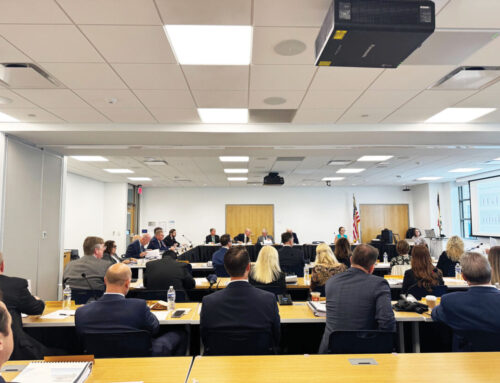Shareholder Proposal No-Action Requests in the 2025 Proxy Season: A Continuing Surge in Re
September 24, 2025
Key Points
- Corporations submitted approximately 35% more no-action requests to the SEC this proxy season to exclude shareholder proposals from their proxy statements, and about 70% of requests were granted.
- The increased success rates in 2024 and 2025 and new staff guidance this year indicate a greater receptiveness to grant no-action requests, but determinations remain highly fact-specific.
- In future proxy seasons, companies should take into account the new staff guidance and the increased success rates for no-action requests based on substantial implementation, economic relevance or that the proposal was false and misleading.
__________
Rule 14a-8 under the Securities Exchange Act of 1934 permits shareholders with relatively nominal shareholdings to submit proposals to companies for inclusion in the companies’ proxy statements. These are to be voted on by shareholders at upcoming annual meetings.
For 2025 annual meetings, submitted proposals continued to focus on corporate governance,
executive compensation, environmental/climate change and social matters.
Companies may exclude shareholder proposals for failing to meet certain procedural and eligibility requirements, or on the basis of one or more of 13 substantive grounds set forth in Rule 14a-8. Typically, companies submit no-action requests to the Staff of the Division of Corporation Finance (Staff) of the Securities and Exchange Commission (SEC), seeking the Staff’s concurrence that a proposal may be excluded.
On February 12, 2025, in an unexpected twist in the middle of the 2025 proxy season, the Staff issued Staff Legal Bulletin No. 14M (SLB 14M), which rescinded Biden-era Staff guidance and addressed, among other topics, the “economic relevance” and “ordinary business” bases for excluding proposals.
SLB 14M also clarified that the substantial implementation, duplication and resubmission bases for exclusion were to be applied consistent with prior SEC and Staff guidance rather than with the 2022 proposed amendments to Rule 14a-8 that had not been adopted.
For the 2025 proxy season, perhaps encouraged by companies’ success in the 2024 season and by SLB 14M, companies submitted approximately 35% more no-action requests than in the year before, and, excluding withdrawals, almost 70% of requests were granted — about the same rate as in 2024.
The most common bases on which proposals were successfully excluded were:
- procedural and eligibility defects, or
- that the proposal related to the company’s ordinary business or would micromanage the company.
Importantly, companies also had greater success than in recent years excluding proposals on the basis of:
- substantial implementation,
- economic relevance or
- being false and misleading.
Companies Successfully Asserted ‘Ordinary Business,’ but Questions Remain
Consistent with prior seasons, the “ordinary business” basis for exclusion was the ground asserted most frequently. Aside from the “micromanagement” prong of this basis for exclusion (discussed below), the Staff concurred with more than half of the ordinary business arguments, which was comparable to the prior year.
Examples where the Staff granted relief on ordinary business grounds included proposals relating to healthy hospital food, worker safety and well-being, collective bargaining rights, company treasury practices and customer accounts, many of which seem unquestionably “ordinary.” In addition, proposals requesting a description of the research and analysis undertaken by the board of directors before making changes to reduce or eliminate diversity, equity and inclusion (DEI) programs also were excluded as ordinary business.
In contrast, proposals relating to smoke-free casinos, financing fossil-fuel energy and risks relating to discrimination based on speech or religion were not excludable on ordinary business grounds.
In SLB 14M, the Staff explained that whether a proposal focuses on a significant policy issue such that it is not excludable as ordinary business is a case-by-case determination depending on the particular policy issue and its significance to the particular company.
In a number of Staff responses rejecting ordinary business arguments, the Staff noted that “the Company has not explained whether the policy issue raised by the Proposal is significant to the Company. Therefore … the Company has not demonstrated that the Proposal relates to its ordinary business operations.” It is not yet clear why the Staff raised this concern in certain contexts and not others, or precisely how a company would convince the Staff that a policy issue is not significant to a particular company.
Micromanagement Arguments Continue To Be Effective
Similarly, the Staff concurred with more than half of the no-action requests arguing that a proposal would micromanage the company. Particularly noteworthy was a number of instances where the Staff granted no-action requests to exclude proposals seeking reports on direct and indirect lobbying expenditures.
Other proposals excluded as micromanagement included a variety of proposals relating to greenhouse gas (GHG) emissions reduction targets or other environmental/climate change matters, employee collective bargaining rights and certain executive compensation matters.
That said, other proposals relating to GHG emissions targets, smoke-free casinos, financing fossil-fuel energy, abolishing DEI programs and combating harassment were not found to constitute micromanagement. In some instances, the boundary between micromanagement and permissible proposals remains gray.
Substantial Implementation Arguments Make a Comeback
The Staff granted no-action relief to more than half of the requests arguing substantial implementation, up from a one-third success rate the prior year. One driver of this increased success rate was a return to the historical Staff position that a company replacing a supermajority voting provision in its charter or bylaws with a majority of the shares outstanding voting standard is substantially implementing a proposal seeking to replace supermajority voting requirements with a majority of the votes cast voting standard.
An interesting split was seen in proposals asking company compensation committees to revisit incentive compensation metrics to eliminate DEI goals, with some companies able to exclude the proposals as substantially implemented and others unable to do so. This serves as an important reminder of the fact-specific nature of substantial implementation arguments.
Economic Relevance Arguments See Some Success
Under the “economic relevance” basis for exclusion, a company may exclude a proposal that relates to operations accounting for less than 5% of the company’s total assets, gross sales and net earnings, and “is not otherwise significantly related to the company’s business.” In SLB 14M, the Staff made clear that the “otherwise significantly related” concept is a company-specific analysis rather than a question of importance in the abstract.
Four proposals were successfully excluded under the relevance test, three involving the sale or distribution of a specific product and one involving the supply chain of a specific ingredient in a particular country. This almost 30% success rate (up from zero) suggests that companies should continue to explore economic relevance arguments when available.
Objectively False and Misleading Proposals May Be Excludable
Companies had moderate success arguing that proposals were false and misleading and therefore excludable as violating the proxy rules. Note, however, that in each of the seven successful instances, according to the Staff, the company was able to demonstrate objectively that certain key factual statements in the proposal were false and misleading.
In contrast, companies were not successful in excluding proposals on the basis that the proposal was overly vague such that shareholders would not understand what they were being asked to vote on.
Nevertheless, the almost 30% success rate (up from zero) indicates a greater willingness on the part of the Staff to hold proponents to a level of accuracy in their proposals that is at least closer to the standard companies must follow in connection with their proxy materials.
This memorandum is provided by Skadden, Arps, Slate, Meagher & Flom LLP and its affiliates for educational and informational purposes only and is not intended and should not be construed as legal advice. This memorandum is considered advertising under applicable state laws.
Search
RECENT PRESS RELEASES
Related Post




